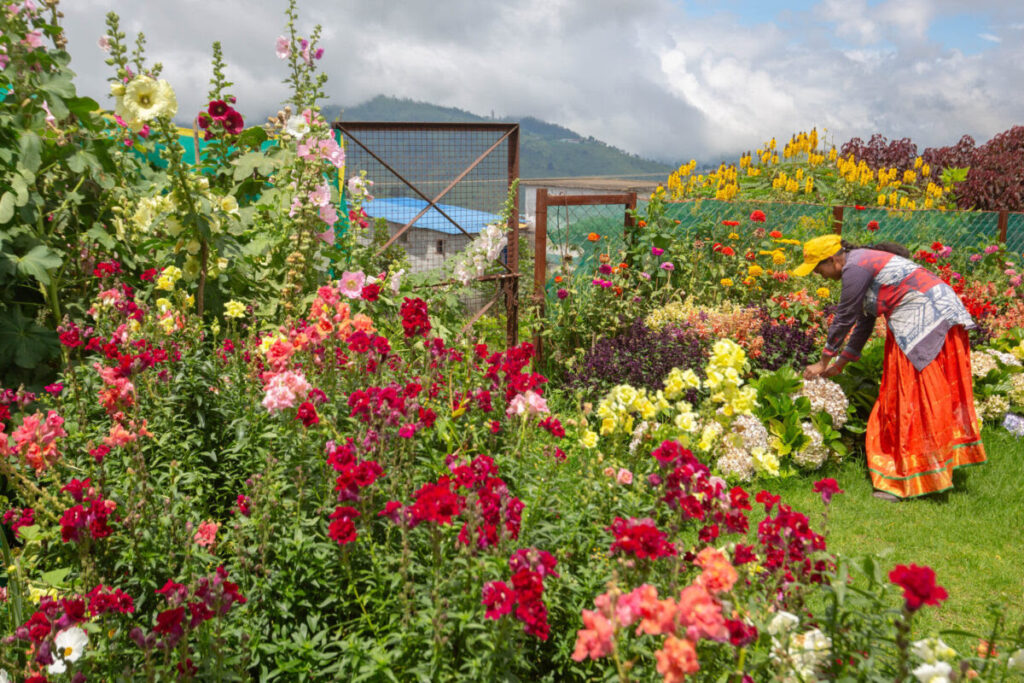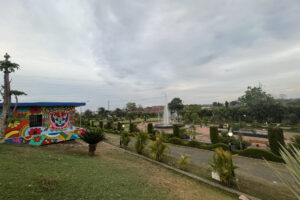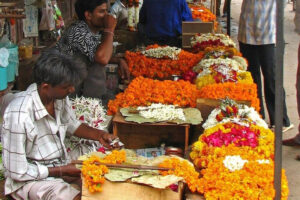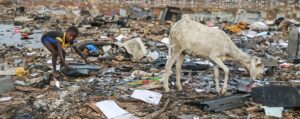Creating Value From Waste: Success Stories

One of the gardeners tends to the plants in a garden adjacent to a dump yard at Oottupattarai in Coonoor (Tamil Nadu), a popular tourist destination. The garden uses compost made from the wet waste segregated at the centre (Image by Abhishek N. Chinnappa/Mongabay)
- Communities across India are finding innovative ways to turn waste into opportunity.
- From composting to cooperatives, these stories show how waste can become a resource.
- Energy-efficient processing techniques are being developed to preserve the economic value of floral biomass while ensuring scalability for industrial applications.
In the ecologically sensitive Aravalli hills, a 40-metre-high mountain of trash looms over Bandhwari village. Receiving tonnes of unsegregated waste every day from Gurugram and Faridabad, the landfill is a stark reminder of the region’s mounting waste crisis. With compostable, non-compostable, hazardous, and electronic waste all dumped together, toxic leachate pools have formed around the site, seeping into the soil and groundwater.
Yet, even as sites such as Bandhwari highlight the scale of the problem, communities across India are finding innovative ways to turn waste into opportunity. From community-led composting to women-run waste collection systems, discarded flowers turned into new materials, and cooperatives providing safer, dignified work for waste pickers, these are stories of change that show what’s possible when waste is seen as a resource.
A blooming tale of transformation
A manicured garden with blooming flowers is arguably the last thing one would associate with a municipal dumpyard. Yet, about 10,000 sq. ft. of garden now skirts Coonoor’s solid waste management centre at Ottupattarai. “We thought of a garden to break the stigma around waste. The thought that it’s unsightly and needs to be avoided has to change,” says Samantha Iyanna, co-founder of Clean Coonoor, the civil society group running the facility.
The garden, featuring perennials, annuals, and native grasses, has won the Ooty flower show competition three years in a row. Grown on compost made at the dumpyard — which produces 50 tonnes monthly — it draws daily visitors, carrying home the message that some waste can be put to good use.
Ambikapur’s women-led waste management model
Once known for its overfilled landfill, Ambikapur in Chhattisgarh’s Surguja district has transformed its former “stinky area” into a garden and a tourist attraction.

“Two factors played a vital role in this transformation — the city’s decentralised waste management infrastructure and the team of 470 women who have been running it for the past eight years,” says Ritesh Saini, nodal officer for waste management at Ambikapur Municipal Corporation.
Ambikapur’s Solid Liquid Resource Management system has created a permanent revenue source for the local municipal corporation. Importantly, the system has reduced the city’s daily waste generation since 2015, eliminating the need for a stinky waste landfill site or a heavy investment in waste processing plants or a waste-to-energy plant, which has not seen success in India, thus far.
Giving flower waste a second life
India, which generates over 300 tons of floral waste every day, stands at the forefront of flower waste innovations. In recent years, several start-ups have developed incense, compost, soaps, and candles from floral waste sourced from religious places and daily activities.

A new tribe of innovators is now exploring the possibilities of this biomaterial to create products that go beyond conventional incense or compost. Some are transforming flower waste into vegan leather, biodegradable packaging material, and sustainable fragrances. Energy-efficient processing techniques are being developed to preserve the economic value of floral biomass while ensuring scalability for industrial applications, though seasonal fluctuations and geographic differences present challenges in maintaining fragrance consistency.
At the global level, designer Irene Purasachit has developed bio (floral) foam from the stems of flower waste; British biotech firm Sparxell creates biodegradable colour pigments from plant-based cellulose. In India, Kanpur-based Phool has developed vegan leather from floral waste, which it calls ‘fleather’. These innovations are the beginning of a new dawn in this ecosystem.
Pune’s just transition for waste pickers
The SWaCH cooperative in Pune formalises the work of waste pickers, offering training, fair wages and safer working conditions, and transitioning members into more dignified roles in waste management.

By promoting waste segregation and recycling, SWaCH helps divert material from landfills — reducing methane emissions and cutting the need for raw material extraction.
SWaCH highlights waste collection as “green” work, offering a just transition model where waste pickers gain dignity and agency while tackling environmental and social challenges.
(Published under Creative Commons from Mongabay India)





